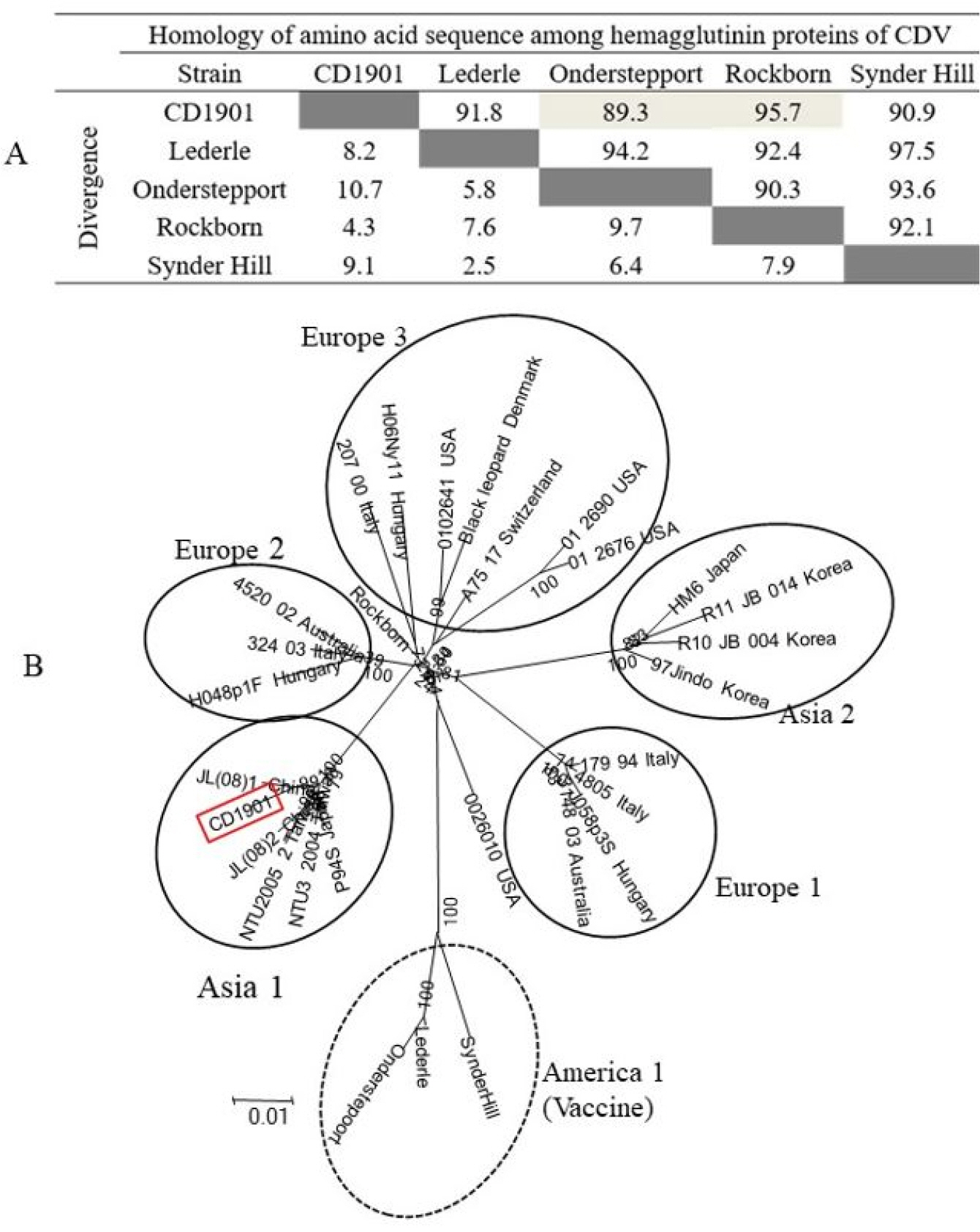J Bacteriol Virol.
2020 Jun;50(2):117-123. 10.4167/jbv.2020.50.2.117.
Evaluation of Commercial Immunochromatographic Test Kits for the Detection of Canine Distemper Virus
- Affiliations
-
- 1Viral Disease Research Division, Animal and Plant Quarantine Agency, MAFRA, Gimcheon 39660, Republic of Korea
- KMID: 2504387
- DOI: http://doi.org/10.4167/jbv.2020.50.2.117
Abstract
- The rapid diagnosis of canine distemper virus (CDV) helps to determine the treatment of dogs in veterinary clinics. We evaluated the performance of seven commercial rapid immunochromatographic test (RICT) kits for the detection of CDV. Six core dog viral pathogens (canine adenovirus type 1 and 2, canine coronavirus, canine parainfluenza virus, canine parvovirus, and rabies virus), five CDV strains (CD1901, Lederle, Rockborn, Onderstepoort, and Synder Hill), and three bacteria (Bordetella bronchiseptica, Leptospira canicola, and Staphylococus aureus) were used to determine the cross-reactivity and detection limits of the kits. The seven commercial RICT kits did not yield positive results with the six dog viruses or the three bacteria. All the RICT kits for CDV detected the Korean CDV isolate. The detection limits of the RICT kits for the Korean CDV isolate, CD1901, belonging to Asia 1 genotype ranged from 103.0 to 104.0 TCID50/mL. There was an average difference of 1.1 in scores judged by eye between four CDV vaccine strains and CD1901 strain. Therefore, the RICT kits enable the detection of CDV vaccine strains, but need to be improved to detect CDV circulating in dog populations in Korea.
Keyword
Figure
Reference
-
1. Appel MJ, Summers BA. Pathogenicity of morbilliviruses for terrestrial carnivores. Vet Microbiol 1995;44:187-91.DOI: 10.1016/0378-1135(95)00011-X.2. Kennedy JM, Earle JAP, Omar S, Abdullah H, Nielsen O, Roelke-Parker ME, et al. Canine and phocine distemper viruses: global spread and genetic basis of jumping species barriers. Viruses 2019;11:944.DOI: 10.3390/v11100944. PMID: 31615092. PMCID: PMC6833027.3. Cha SY, Kim EJ, Kang M, Jang SH, Lee HB, Jang HK. Epidemiology of canine distemper virus in wild raccoon dogs (Nyctereutes procyonoides) from South Korea. Comp Immunol Microbiol Infect Dis 2012;35:497-504.DOI: 10.1016/j.cimid.2012.04.006. PMID: 22608695.4. Bae CW, Lee JB, Park SY, Song CS, Lee NH, Seo KH, et al. Deduced sequences of the membrane fusion and attachment proteins of canine distemper viruses isolated from dogs and wild animals in Korea. Virus Genes 2013;47:56-65.DOI: 10.1007/s11262-013-0916-0. PMID: 23624803.5. Li W, Cai C, Xue M, Xu G, Wang X, Zhang A, et al. Phylogenetic analysis of canine distemper viruses isolated from vaccinated dogs in Wuhan. J Vet Med Sci 2018;80:1688-90.DOI: 10.1292/jvms.18-0116. PMID: 30175724. PMCID: PMC6261815.6. Beineke A, Puff C, Seehusen f, Baumgärtner W. Pathogenesis and immunopathology of systemic and nervous canine distemper. Vet Immunol Imuunopathol 2009;127:1-18.DOI: 10.1016/j.vetimm.2008.09.023. PMID: 19019458.7. Deem SL, Spelman LH, Yates RA, Montali RJ. Canine distemper in terrestrial carnivores: a review. J Zoo Wildl Med 2000;31:441-51.DOI: 10.1638/1042-7260(2000)031[0441:CDITCA]2.0.CO;2.8. An DJ, Kim TY, Song DS, Kang BK, Park BK. An immunochromatography assay for rapid antemortem diagnosis of dogs suspected to have canine distemper. J Virol Methods 2008;147:244-9.DOI: 10.1016/j.jviromet.2007.09.006. PMID: 17950910. PMCID: PMC7119767.9. Latha D, Geetha M, Ramadass P, Narayanan RB. Evaluation of ELISA based on the conserved and functional middle region of nucleocapsid protein to detect distemper infection in dogs. Vet Microbiol 2007;120:251-60.DOI: 10.1016/j.vetmic.2006.11.019. PMID: 17224247.10. Shin YJ, Cho KO, Cho HS, Kang SK, Kim HJ, Kim YH, et al. Comparison of one-step RT-PCR and a nested PCR for the detection of canine distemper virus in clinical samples. Aust Vet J 2004;82:83-6.DOI: 10.1111/j.1751-0813.2004.tb14651.x. PMID: 15088966.11. Liu Y, Liu C, Liu W, Wu H, Ding H, Cao Y, et al. Isolation and sequence analysis of the complete H gene of canine distemper virus from domestic dogs in Henan Province, China. Arch Virol 2019;164:2153-8.DOI: 10.1007/s00705-019-04298-7. PMID: 31134355. PMCID: PMC7086856.12. Gray LK, Crawford PC, Levy JK, Dubovi EJ. Comparison of two assays for detection of antibodies against canine parvovirus and canine distemper virus in dogs admitted to a Florida animal shelter. J Am Vet Med Assoc 2012;240:1084-7.DOI: 10.2460/javma.240.9.1084. PMID: 22515628.13. Eggerbauer E, de Benedictis P, Hoffmann B, Mettenliter TC, Schlottau K, Ngoepe EC, et al. Evaluation of six commercially available rapid immnochromatographic tests for the diagnosis of rabies in brain material. PloS Negl Trop Dis 2016;10:e0004776.DOI: 10.1371/journal.pntd.0004776. PMID: 27336943. PMCID: PMC4918935.14. Lyoo KS, Yeom M, Kim J, Kim D, Ha G, Na W, et al. Development of rapid immunochromatographic strip test for the detection of porcine epidemic diarrhea virus. Vet Rec 2017;181:596.DOI: 10.1136/vr.103959. PMID: 28993477. PMCID: PMC5738603.15. Han JI, Kang SY, Na KJ. Comparison of canine distemper viruses in domestic dogs and wild raccoon dogs in South Korea. Vet Rec 2010;167:828-30.DOI: 10.1136/vr.c3377. PMID: 21262634.16. Fischer CD, Ikuta N, Canal CW, Makiejczuk A, Allgayer Mda C, Cardoso CH, et al. Detection and differentiation of field and vaccine strains of canine distemper virus using reverse transcription following by nested real time PCR (RT-nqPCR) and RFLP analysis. J Virol Methods 2013;194:39-45.DOI: 10.1016/j.jviromet.2013.08.002. PMID: 23942341. PMCID: PMC7113657.17. Piewbang C, Rungsipipat A, Poovrawan Y, Techangamsuwan S. Development and application of multiplex PCR assays for detection of virus-induced respiratory disease complex in dogs. J Vet Med Sci 2017;78:1847-54.DOI: 10.1292/jvms.16-0342. PMID: 27628592. PMCID: PMC5240764.
- Full Text Links
- Actions
-
Cited
- CITED
-
- Close
- Share
- Similar articles
-
- Clinical evaluation of a rapid diagnostic test kit for detection of canine coronavirus
- Evaluation of commercial immunochromatography test kits for diagnosing canine parvovirus
- Serologic Survey of Rabies Virus, Canine Distemper Virus and Parvovirus in Wild Raccoon Dogs (Nyctereutes procyonoides koreensis) in Korea
- Use of hydrophilic extra-viral domain of canine distemper virus H protein for enzyme-linked immunosorbent assay development
- Evaluation of a Rapid Detection Influenza Virus A Antigens Kit Using Paired Serum Antibody Test


